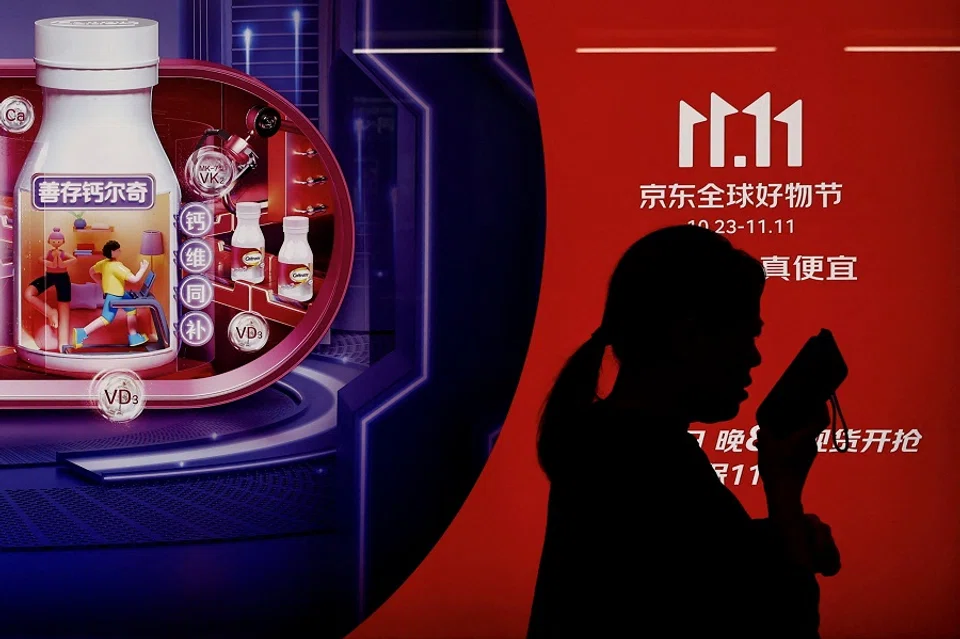China's weak domestic demand drags down Singles' Day sales
Singles' Day is known as the sales day of the year, but this year the buzz seems to have gone out of it, as people are choosing not to spend as much as before. As the event marks its 15th year, the general vibe is no longer excitement, but fatigue. Lianhe Zaobao correspondent Chen Jing tells us more.

During a cold snap in Shanghai last week, I went to the mall near my place to buy more clothes. To my surprise, the Canada Goose store, which saw long queues in previous years for its down jackets, was quiet.
As soon as I entered the store, a sales assistant warmly greeted me and showed me several different styles of jackets. She even wanted me to add her on WeChat, "If you have questions, ask anytime." I recalled two years ago, when I was shopping here with my friend - the store was packed, and the sales assistants did not have time to attend to us.
Hearing about my experience, my friend chuckled and said, "It means that everyone's broke. Don't even talk about Canada Goose - I could only buy daily necessities during this year's Singles' Day sales."
Cold reception for Singles' Day sales
It seems that the 11 Nov Singles' Day sale - the biggest online shopping extravaganza of the year - also experienced a cold snap. Baidu index showed that peak searches for this year's Singles' Day sales fell 60% year-on-year, while the hottest Singles' Day sales topic on Weibo was in fact: "Are Singles' Day sales not moving?"
... they [e-commerce platforms] went for the simplest and crudest approach: price wars.
According to a survey of 3,000 Chinese consumers by management consulting firm Bain & Company, only 53% of shoppers were excited by Singles' Day, compared with 76% in 2021. Also, 77% of consumers (compared to 76% last year) estimated that they were not going to increase their spending this year.

Faced with "cold" consumers, major e-commerce platforms did all they could to hype up the event. Compared with the previous two years, e-commerce platforms did away with complicated discount rules and no longer required consumers to stay awake and make their purchases only at midnight. Instead, they went for the simplest and crudest approach: price wars.
The slogan for Taobao's Singles' Day sales was "the lowest prices on the internet", while JD.com's theme was "so cheap"; Pinduoduo even rolled out a "10 billion RMB subsidy" initiative to compete for the lowest prices.
Price wars
The intense price war not only made e-commerce platforms high-strung, but also hit merchants hard. It was reported that Alibaba's merchants had to offer rock-bottom prices or be removed from the platform's Singles' Day promotions. Electric appliance brand Hauswirt even reported JD.com to market regulators, as the latter had unilaterally slashed their products' prices by 30 RMB (US$4.13) to offer "the lowest prices on the internet", forcing the company to bear the losses.
Notwithstanding the flood of positive news, Alibaba and JD.com did not disclose the overall sales figures for the Singles' Day shopping event for the second year in a row.
Following the aggressive price war, Alibaba and JD.com both reported year-on-year sales growth. Tmall said that 402 brands recorded transactions surpassing 1 billion RMB, while 38,600 brands recorded transactions that jumped more than 100% year-on-year. JD.com said that 60 brands each surpassed 1 billion RMB in sales, and almost 20,000 brands saw transaction volumes that trebled from a year earlier.

Notwithstanding the flood of positive news, Alibaba and JD.com did not disclose the overall sales figures for the Singles' Day shopping event for the second year in a row.
This is not the first time this has happened. In June this year during the 618 shopping festival - an annual weeks-long Black-Friday style event - involution (内卷 neijuan, meaningless intense competition) among e-commerce platforms already drew attention. JD retail chief Xin Lijun kicked off the 618 event with the catchline "sharing profits, making friends", while Pinduoduo's slogan was "every day is 618". And after the event, none of the e-commerce platforms revealed sales figures.
Shift in mood
Colleagues spoke of how in the first few years of Singles' Day, e-commerce platforms would invite the media to join them at their live-streaming lobby to watch on the big screen how quickly sales hit the 100 million RMB mark; the excitement would grow as the moment approached.
As Singles' Day marks its 15th year, the mood has shifted from excitement to fatigue. When price reduction has become the only effective - and not that effective - method to compete, it is a clear sign that merchants have "run out of tricks" while consumers have "run out of money".
The latest statistics released on 15 November by China's National Bureau of Statistics showed that though total retail sales of consumer goods in October grew more than predicted year-on-year, it was due to last year's poor performance. Affected by weak sentiment in the property market, consumption of household products such as furniture and home decor is still seeing sluggish recovery.
... their attitude towards the Singles' Day sales is no longer "if I miss that one day, I will have to wait a year," but rather "by not buying anything, I'm immediately saving 100% of my money".
The Consumer-Price Index (CPI), which reflects inflation, dropped 0.2% year-on-year in October, going back to negative growth after two months. The Producer Price Index (PPI) declined for the 13th consecutive month, while the decline also grew, which intensified market concerns that the economy is experiencing deflation, and also highlighted the challenges that Chinese officials face in their efforts to spur domestic demand.

Weak domestic demand is not only reflected in the macro data, but is also manifested on the micro level. On social media platform Xiaohongshu, young people are no longer hyped up about buying luxury items; instead, they are happily sharing how they have saved money by buying discounted products near their expiry dates.
Fewer people are sharing pictures of their travels, while more are joining discounted senior tour groups. Even in shopping centres, one feels the reduced footfall at the stores and restaurants on the upper levels, with the crowds gathering instead at the food stores and supermarkets on the lower levels, where prices are relatively cheaper.
Less spending among consumers
The rise of "reverse consumption" and "seniors-tag-along consumption" is an indirect reflection of the declining economy and the impact of high unemployment on young people, who are major consumers. When people are no longer optimistic about their future and their income, their attitude towards the Singles' Day sales is no longer "if I miss that one day, I will have to wait a year," but rather "by not buying anything, I'm immediately saving 100% of my money".
Involution has become a buzzword in Chinese society in recent years, referring to how when an industry fails to achieve a breakthrough, it is doomed to constantly make complicated transformations internally, causing industry players to have to put in even more effort in order to compete for already scarce resources. This term was once used to describe things like working overtime in Internet firms, the intense competition of degree holders from prestigious schools, and the anxiety parents faced in raising children. Now, "involution" has hit the Chinese consumer market, which has long been a badge of pride.
When e-commerce businesses are unable to expand the pie, but can only think of ways to fight for a larger slice of the existing pie, it does not help industry innovation, and could also easily cause a vicious cycle. The involution of the Singles' Day event has sounded the alarm that domestic demand still needs to be stimulated, and it cannot fall solely to a few e-commerce platforms to solve the problem.
This article was first published in Lianhe Zaobao as "双十一也内卷".




![[Photos] Fact versus fiction: The portrayal of WWII anti-Japanese martyrs in Taiwan](https://cassette.sphdigital.com.sg/image/thinkchina/3494f8bd481870f7c65b881fd21a3fd733f573f23232376e39c532a2c7593cbc)
